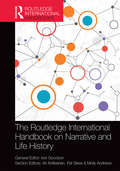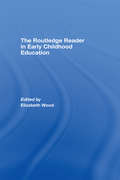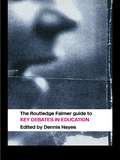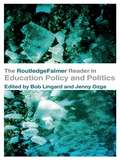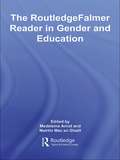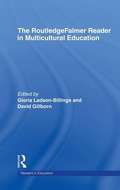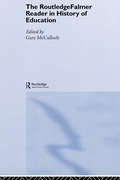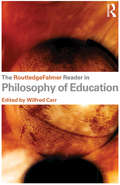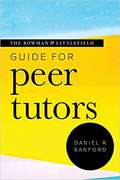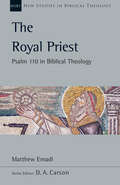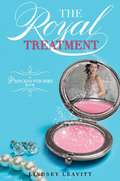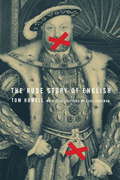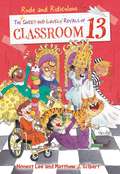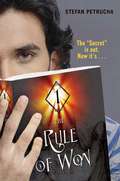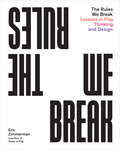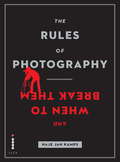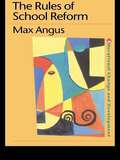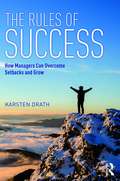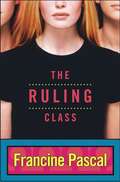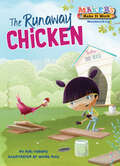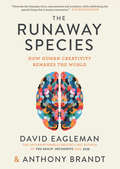- Table View
- List View
The Routledge International Handbook on Narrative and Life History (Routledge International Handbooks of Education)
by Molly Andrews Pat Sikes Ivor Goodson Ari AntikainenIn recent decades, there has been a substantial turn towards narrative and life history study. The embrace of narrative and life history work has accompanied the move to postmodernism and post-structuralism across a wide range of disciplines: sociological studies, gender studies, cultural studies, social history; literary theory; and, most recently, psychology. Written by leading international scholars from the main contributing perspectives and disciplines, The Routledge International Handbook on Narrative and Life History seeks to capture the range and scope as well as the considerable complexity of the field of narrative study and life history work by situating these fields of study within the historical and contemporary context. Topics covered include: • The historical emergences of life history and narrative study • Techniques for conducting life history and narrative study • Identity and politics • Generational history • Social and psycho-social approaches to narrative history With chapters from expert contributors, this volume will prove a comprehensive and authoritative resource to students, researchers and educators interested in narrative theory, analysis and interpretation.
The Routledge Reader in Early Childhood Education
by Elizabeth WoodEarly childhood education has always provoked passionate feelings amongst stakeholders at all levels, from practitioners working with children and families in pre-school and school settings, to advisers, managers, politicians, and academicsThe purpose of this reader is to examine change, transformation and continuity, and to present indicative scholarship in relation to five key themes: theoretical perspectives on learning curriculum and pedagogy play policy professionalism and research methods Within each theme, the readings have been chosen to exemplify national and international perspectives and trends. This is not to present a homogenised view of early childhood provision and services across cultural contexts; rather the intention is to take a critical perspective on past, present and future directions, and to identify some of the challenges, dilemmas and contradictions posed in research and scholarship.
The RoutledgeFalmer Guide to Key Debates in Education
by Dennis HayesDebating is out of fashion. No one raises the question of what has gone wrong when the entire political project of a society is seemingly reduced to 'education, education, education'.The aim of this lively and challenging book is to provide the stimulus for further thinking about key educational issues by exposing and explaining the assumptions behind this obsession. Over forty contributors, all experts in their fields, have written short, accessible, informed and lively articles for students, teachers and others involved in education. They address broad questions that are central to any understanding of what is really going on in the education system.Topics covered include: the new relationship of the state to education; the changed nature of schools; whether teachers are afraid to teach; the problems with circle time, anti-bullying strategies, citizenship education, and multiple intelligences; the retreat from truth and the demise of theory in teacher training, and much more. Everyone learning to teach in primary and secondary schools and further education colleges will find this book relevant to their programmes. In particular the book would be useful for students on Education Studies courses.
The RoutledgeFalmer Reader in Education Policy and Politics (RoutledgeFalmer Readers in Education)
by Bob Lingard Jenny OzgaThis Reader brings together selected papers from leading scholars to address the most significant recent development in educational policy and politics: the impact of globalisation. The papers discuss, document and analyse evidence of globalisation’s effects on the new direction of education policies and practices, and in the production of globalised agendas for the redesign of state provision and the governance of education. The Reader is organised in two parts. The first part provides a selection of articles that interrogate globalisation and its effects from a variety of analytical perspectives, and explore what kind of politics are possible in the framing context of globalisation. The second part documents and discusses different types of engagement with politics and policy in a variety of settings and sectors, including numerous European and Pacific Rim policy contexts. This important collection underlines the need to approach globalisation, education policy and politics from numerous perspectives, and offers analytical, empirical and theoretical resources for the reframing of contemporary education politics. Students of educational policy and politics will find this Reader an invaluable resource for understanding, theorising and researching in these academic fields.
The RoutledgeFalmer Reader in Gender & Education (RoutledgeFalmer Readers in Education)
by Madeleine Arnot Mairtin Mac An GhaillThis new Reader brings together classic pieces of gender theory, as well as examples of the sophistication of contemporary gender theory and research methodologies in the field of education. Leading international gender researchers address current debates about gender, power, identity and culture and concerns about boys’ and girls’ schooling, gender achievement patterns, the boys’ education debate, and gender relationships in the curriculum, the classroom and youth cultures. The Reader is divided into six sections which reflect contemporary concerns about Gender and Education: Gender and Educational Theory Difference and Power Identity Work Knowledge and Pedagogy Reflexivity and Risk Gender and Citizenship. A specially written Introduction from the editors, both experts in feminist and masculinity research, provides a much-needed context to the current educational climate. Undergraduates, postgraduates and academics interested in education, gender studies and women’s studies will find this a stimulating and important resource. The analysis of the gender dimensions of the curriculum, teaching and alternative pedagogies also provide important insights for practitioners wishing to promote gender equality.
The RoutledgeFalmer Reader in Multicultural Education
by Gloria Ladson-Billings David GillbornThis unique publication brings together scholarship from both sides of the Atlantic, focusing on the central questions that shape the field of Multicultural Education. It offers the reader a great opportunity to achieve a real grasp of the subject, facilitating understanding and articulation of key debates, and making important topics, concepts, and theories accessible to a broad audience. The editors have assembled a collection of articles of immense scope and pertinence, making this an excellent must-buy resource book for undergraduates, postgraduates, education practitioners, academics, and anyone concerned with race equality and multicultural education.
The RoutledgeFalmer Reader in the History of Education (Routledgefalmer Readers In Education Ser.)
by Gary McCullochThis Reader brings together a wide range of material to present an international perspective on topical issues in history of education today. Focusing on the enduring trends in this field, this lively and informative Reader provides broad coverage of the subject and includes crucial topics such as:* higher education* informal agencies of education* schooling, the state and local government* education and social change and inequality* curriculum* teachers and pupils* education, work and the economy* education and national identity.With an emphasis on contemporary pieces that deal with issues relevant to the immediate real world, this book represents the research and views of some of the most respected authors in the field today. Gary McCulloch also includes a specially written introduction which provides a much-needed context to the role of history in the current educational climate.Students of history and history of education will find this Reader an important route map to further reading and understanding.
The RoutledgeFalmer Reader in the Philosophy of Education (Routledgefalmer Readers In Education Ser.)
by Wilfred CarrThis Reader brings together a wide range of material to present an international perspective on topical issues in philosophy of education today. Focusing on the enduring trends in this field, this lively and informative Reader provides broad coverage of the field and includes crucial topics.With an emphasis on contemporary pieces that deal with issues relevant to the immediate real world, this book represents the research and views of some of the most respected authors in the field today. Wilfred Carr also provides a specially written introduction which provides a much-needed context to the role of philosophy in the current educational climate.Students of philosophy and philosophy of education will find this Reader an important route map to further reading and understanding.
The Rowman and Littlefield Guide for Peer Tutors
by Daniel R. SanfordThe Rowman & Littlefield Guide for Peer Tutors introduces college students to the field of peer tutoring, providing a theoretical background and practical guidance for peer tutors in higher education. Taking an innovative approach firmly grounded in the science of learning and cognition, the text guides college students in thinking critically about their work as educators and in making informed choices in working with learners. <p><p> A vibrant, engaging read, the text covers topics essential for all peer tutors, across writing, mathematics, the sciences, languages, and other disciplines: the brain-based reality of learning, active and collaborative pedagogies, the role of learning centers in colleges and universities, models for tutoring, the transition to college, metacognition, study strategies, online environments, antiracism in centers for peer-led learning, and much more. An ideal supporting text for both tutor training programs and courses for peer educators, this book provides support for learning and writing center administrators in welcoming college students to the field of peer-led learning and for tutors in the work of acting as guides and mentors to the fields of inquiry that exist within the academy.
The Royal Priest: Psalm 110 in Biblical Theology (New Studies in Biblical Theology #Volume 60)
by Matthew H. EmadiDespite its importance in the New Testament and the priestly messianic promise identified by King David, relatively little has been written on Psalm 110 from a biblical-theological perspective.By considering David's biblical warrant for bringing together priesthood and kingship in a single figure, Matthew Emadi shows how we are able to uncover the theological foundation on which Psalm 110 is built. He situates the psalm in Scripture's storyline, showing that Melchizedek's royal priesthood is tied to both creation and redemption.
The Royal Treatment (A Princess For Hire Book Series)
by Lindsey LeavittWhat girl wouldn’t swoon over the outrageous perks in Desi's life as a princess substitute? <P><P>Desi gets to hang out with crush-worthy Prince Karl, and the Façade agency has taken a special interest in her magical abilities. <P><P>But between sub training, starting the eighth grade, and dealing with the cute-but-bossy new boy Reed, she’s beginning to feel like she’s in over her head. <P><P>Even worse, when Desi learns a secret about the magic that keeps Façade running, she realizes that not everything is as perfect as it seems. <P><P> Perfect for fans of The Princess Diaries and full of humor and heart, this second installment in the Princess for Hire series shows Desi that the royal treatment may just be masking mysteries, and only she can uncover the truth....one princess at a time!
The Royal Wardrobe
by Rosie HarteA WHOLE NEW ROYAL HISTORY, WITH A VERY STYLISH TWISTWhy did women wear such heavy and uncomfortable skirts in the Elizabethan era?What the hell happened to Charles II's pubic hair wig?How did Princess Diana's revenge dress become so iconic?Fashion for the Royal Family has been one of their most powerful weapons and plays a key role in why they still exist today. Their clothes are imbued with meaning, with history, and with majesty but at their core they tell a story. Their clothes reveal complex individuals with fears, preferences, demands, and insecurities just like us, sometimes they are weird and wonderful, sometimes they are stately and dramatic, either way they explode with the personalities of the people that wore them.From the TikTok sensation, Rosie Harte, The Royal Wardrobe dives into a horrible history and colourful past that will surprise and fascinate. From the Tudors to the Victorians right through to the 21st Century family rife with drama and division, there is so much still to uncover and explore. Their clothes tell stories and hide secrets, you just need to know how to read them.(P) 2023 Headline Publishing Group Limited
The Royal Wardrobe
by Rosie HartePeek into the wardrobes of history's most fashionable royalsFashion for the royal family has long been one of their most powerful weapons. Every item of their clothing is imbued with meaning, history and majesty, telling a complex tale of the individuals who wore them and the houses they represented.From the draping of a fabric to the arrangements of jewels, the clothing worn by royals is anything but coincidental. King at just nine years old, Edward VI's clothes were padded to make him seem stronger and more manly; and the ever-conscious Elizabeth II insisted her coronation gown include all the representative flora of the commonwealth nations, and not just that of the United Kingdom. Yet reigning monarchs are not the only ones whose fashion sensibilities could mean make or break for the crown.Original and enlightening, Rosie Harte's complete history delicately weaves together the fashion faux pas and Vogue-worthy triumphs that chart the history of our royals from the Tudors to the Victorians right through to King Charles III and our twenty-first-century royal family. Travelling far beyond the bounds of the court, The Royal Wardrobe reveals the economic, social and political consequences of royal apparel, be it breeches, tiara, wig or waistcoat.Each stitch has a story, you just need to know how to read them
The Royal Wardrobe
by Rosie HartePeek into the wardrobes of history's most fashionable royalsFashion for the royal family has long been one of their most powerful weapons. Every item of their clothing is imbued with meaning, history and majesty, telling a complex tale of the individuals who wore them and the houses they represented.From the draping of a fabric to the arrangements of jewels, the clothing worn by royals is anything but coincidental. King at just nine years old, Edward VI's clothes were padded to make him seem stronger and more manly; and the ever-conscious Elizabeth II insisted her coronation gown include all the representative flora of the commonwealth nations, and not just that of the United Kingdom. Yet reigning monarchs are not the only ones whose fashion sensibilities could mean make or break for the crown.Original and enlightening, Rosie Harte's complete history delicately weaves together the fashion faux pas and Vogue-worthy triumphs that chart the history of our royals from the Tudors to the Victorians right through to King Charles III and our twenty-first-century royal family. Travelling far beyond the bounds of the court, The Royal Wardrobe reveals the economic, social and political consequences of royal apparel, be it breeches, tiara, wig or waistcoat.Each stitch has a story, you just need to know how to read them
The Rude Story of English
by Tom HowellThere are only two problems with the story of the English language: one, no hero. Two, not rude enough. In The Rude Story of English, recovering lexicographer Tom Howell swiftly remedies these and gives us a rousing account of our language - without all the boring bits and with all the interesting parts kept in - and reveals English's boisterous, at times obnoxious, character.From a haphazard beginning in 449 AD, when a legendary, fearsome Germanic warrior named Hengest tripped and fell onto British shores, the real story of English has been rife with accident, physical comedy, phallic monuments, rude behaviour, dubious facts, and an alarming quantity of poetry written by lawyers.Across vast distances of space and time, from the language's origins to its fast-approaching retirement, a moody and miraculously long-lived Hengest voyages to the pubs of Chaucer's London, aboard pirate ships in the north Atlantic, to plantations in Barbados, bookstores in Jamaica, the chilly inlet of Quidi Vidi, Newfoundland, a private men's club in Australia, and beyond.Part Monty Python sketch, part Oxford English Dictionary, The Rude Story of English displays an exuberant love of language and a sharp, anti-authoritarian sense of humour. Entertaining and informative, it looks at English through its most uncomfortable, colourful, and off-putting parts, chronicling the story of the language as it has never been told before.
The Rude and Ridiculous Royals of Classroom 13: By Honest Lee And Matthew J. Gilbert: Art By Joelle Dreidemy (Classroom 13 #6)
by Honest Lee Matthew J. GilbertAs heard by kids everywhere on the Echo Dot Kids Edition, the Classroom 13 books are a hilarious new chapter book series-perfect for reluctant readers and fans of Roald Dahl, Captain Underpants, and Sideways Stories from Wayside School.The Rude and Ridiculous Royals of Classroom 13 is the sixth title in a series about the students of a very unlucky classroom. The easy-to-read chapters are full of humor, action, secret codes, and fun-and will prompt hours of conversation among friends, families, and classmates. The final chapter encourages young readers to write their own chapter and send it in to the author, Honest Lee.When Classroom 13 goes on a field trip, a magical mishap turns the students into queens and kings-who get to MAKE (or BREAK) NEW LAWS!You might think this was cool, but it was crazy! With reckless rulers comes horrible homework, dangerous drivers, weird weddings, and other ludicrous laws. The students of Classroom 13 are about to learn that becoming royalty can be a royal pain in the butt.© 2018 by Hachette Book Group, Inc.
The Rule of Won
by Stefan PetruchaCaleb Dunne, the quintessential slacker, is pressured by his girlfriend to join a high school club based on "The Rule of Won", which promises to fulfill members' every "crave". but when nonbelievers start being ostracized and even hurt, Caleb must act.
The Rules We Break: Lessons in Play, Thinking, and Design
by Eric ZimmermanWhether you're a game player, a designer of any kind, or someone who wants to know more about design, The Rules We Break will open your mind to creative and thought-provoking approaches to design. Play through more than 20 hands-on, real-world games and exercises to explore how people think, how games and systems work, and how to move through a creative process. Everyone can learn from game design: interaction designers and software developers, graphic designers and urban planners, kids in after-school programs and university students studying design. This collection of interactive games and exercises is designed to help you consider new ways of approaching productive collaboration, creative problem solving, analysis of systems, and how to communicate ideas, providing skills you can use in any discipline or situation. These real-world exercises are designed to be played on tabletops, as playground-style physical games, and via social interactions with others in person or online. A wide range of entertaining, thought-provoking games, exercises, and short essays grow in complexity over the course of the book, from 20 minutes of play to design projects that last for days or weeks. Award-winning game designer Eric Zimmerman invites you to play your way through it all, learning about play, systems, and design along the way.
The Rules of Photography and When to Break Them
by Haje Jan KampsOne of the most popular cameras on the market is called the 'Digital Rebel' yet many photographers use it and its brethren to follow tired old rules from tired old photographers.This book shows you how to move beyond the dogma and shoot more creatively.If you're just starting out with a camera, or are starting to think about switching away from Auto mode, then this is the perfect book for you. Not only will you find within all the classical rules of photography - useful basic knowledge that can sharpen anyone's eye for finding great photographs - but you'll simultaneously be shown how you can push the boundaries that many teachers set, filling your memory card with exciting, different pictures that push the limits.After all, unless you understand the confines of the box, you can't consciously decide to think outside of it, can you?
The Rules of School Reform (Educational Change And Development Ser.)
by Max AngusWhy do new legislative acts and regulations designed to improve schools have little impact on teaching? Why have so many attempts at school reform been so notably unsuccessful?; While seeking to answer these questions, Angus examined the complex issue of rules and regulations. He found a shell of rules around teaching that is guarded by unions and departmental officials. This shell is made up not only of official rules but also informal rules, some of which, even though unspoken, are highly influential. Collectively, these rules provide stability but also confine the extent of any change.; In "The Rules of School Reform" the author draws two separate but related conclusions that have serious implications for school improvement. Firstly, as long as the basic regulatory structures are left in place there is unlikely to be any enduring change to teaching. Secondly, should officials remove these structures, they will lose control of the system they are employed to manage. There is no escape from this dilemma. The author asks how can school reform succeed, unless we examine how established rule systems shape classroom life?
The Rules of Success: How Managers Can Overcome Setbacks and Grow
by Karsten DrathThis book is about the rules of long-term professional success. The international study on which this book is based suggests that success is, above all, one thing: the quest for a combination of happiness and satisfaction, coupled with economic independence. However, the data also suggest that the definition of success varies significantly from person to person. And furthermore, it seems like success is not an objective quality, but at least partly it results from a process of comparison with a peer group - which means in turn that the selection of your peer group is crucial for your perceived level of success in life. The author argues that, in fact, certain success factors do exist and that they are fewer in number than one might think. But above all, if we look thoroughly at the lives of truly successful people, it soon becomes apparent that success primarily has to do with overcoming setbacks, failure and crisis. This ability to effectively process adversity is also known as resilience. Because of its criticality for success this concept is discussed in greater depth using the FiRE model (Factors improving Resilience Effectiveness) as a structure. This concept has been developed by the author through many years of research. It differs from existing models due to its holistic approach including analysing different disciplines of science such as biology, medicine, brain research, epigenetics, sociology, psycho-neuro-immunology etc.
The Ruling Class
by Francine PascalIn the posh suburban Dallas high school of Highland Park, the beautiful and perfect Jeanette Sue is queen. The Ruling Class, her clique of spectacularly cruel girls, runs the school. Brutally. And no one questions them. Certainly not the little suck-up Myrna Fry, whose only aim in life it to be part of the Ruling Class, no matter what or who gets trashed. It's a nightmare school caught in the grips of terror until the arrival of the totally undesirable, absolutely unfashionable, and -- way worse -- poor Twyla Gay Stark. And then, of course, there is the tall and gorgeous hunk, Ryder McQuaid, Jeanette Sue's property. Or so Jeanette Sue thinks.
The Rumor Report; The Big Jump
by John Martin Staci SwedeenKate wants to be popular like her best friend, Marisa, who lets Josh's friend know that Kate wants to go to the dance with Josh. But Josh only wants to borrow Kate's homework. Brothers Sam and David are about to zip-line through a rain forest when an emotional conflict reaches a new high among the treetops. How will these teens deal with their issues? Read the plays to find out.
The Runaway Chicken: Woodworking (Makers Make It Work)
by Kiki ThorpeTying into the popular Makers Movement, Makers Make it Work is a series of fun easy-to-read stories that focus on problem-solving and hands-on action. With bright, eye-catching art and explanatory sidebars with additional information on the topic, these books show kids how to use their hands, their heads, their creativity, and their problem-solving skills to overcome every challenge facing them. There&’s a chicken on the loose! Maddy takes it home, but chickens are not good house pets. Can Maddy find—or make!—a better place to keep it? With the Makers Make It Work series, any kid can be a Maker! Each book also includes an activity for young makers to try themselves. (Topic: Woodworking)
The Runaway Species: How human creativity remakes the world
by Anthony Brandt David Eagleman&“The authors look at art and science together to examine how innovations—from Picasso&’s initially offensive paintings to Steve Jobs&’s startling iPhone—build on what already exists and rely on three brain operations: bending, breaking and blending. This manifesto . . . shows how both disciplines foster creativity.&” —The Wall Street JournalThe Runaway Species is a deep dive into the creative mind, a celebration of the human spirit, and a vision of how we can improve our future by understanding and embracing our ability to innovate. David Eagleman and Anthony Brandt seek to answer the question: what lies at the heart of humanity&’s ability—and drive—to create?Our ability to remake our world is unique among all living things. But where does our creativity come from, how does it work, and how can we harness it to improve our lives, schools, businesses, and institutions?Eagleman and Brandt examine hundreds of examples of human creativity through dramatic storytelling and stunning images in this beautiful, full–color volume. By drawing out what creative acts have in common and viewing them through the lens of cutting–edge neuroscience, they uncover the essential elements of this critical human ability, and encourage a more creative future for all of us.&“The Runaway Species approach[es] creativity scientifically but sensitively, feeling its roots without pulling them out.&” —The Economist
